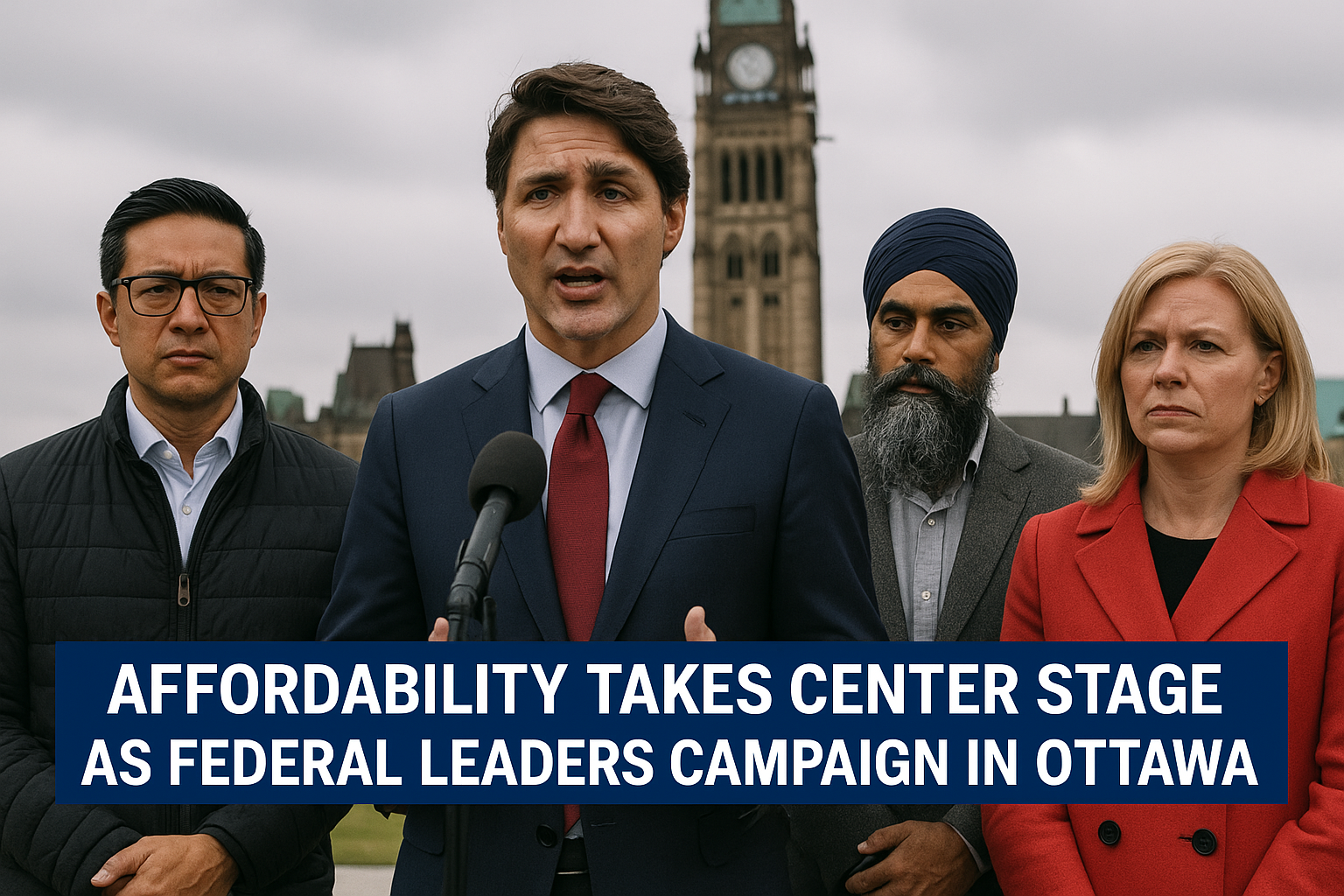OTTAWA — As the federal election campaign reached its first weekend, affordability emerged as a dominant theme, with both the NDP and Conservative Party offering solutions to ease the financial strain on Canadians. NDP Leader Jagmeet Singh proposed emergency price caps on essential food items, while Conservative Leader Pierre Poilievre focused on expanding tax write-offs for trades workers.
Both leaders made appearances in Ottawa on Saturday, marking key moments in the ongoing election battle. Singh visited a local food bank in Ottawa Centre, while Poilievre, who became the first national leader to campaign in the prairie provinces, held a rally in Winnipeg.
NDP Pushes for Emergency Price Caps on Food
Singh made a bold promise, vowing to introduce emergency price caps on staple food items, such as pasta, frozen vegetables, and infant formula. The NDP leader also advocated for higher taxes on grocery chain profits and stronger competition regulations for the sector. He emphasized that the rising costs of food have left many Canadians struggling at the checkout, with particular concern around the impact of U.S. tariffs under President Trump.
“A lot of Canadians are worried about how much it costs them when they go to the grocery store,” Singh said, underscoring that his proposal would mirror actions taken in countries like France and Greece. The NDP argued that the proposed caps would not require federal subsidies, but instead only minimal public-service resources to implement.
Singh’s strong stance against corporate grocery chains, whom he accused of “ripping off” consumers, was central to his messaging, resonating with many Canadians frustrated by grocery store prices.
Poilievre Focuses on Supporting Trades Workers
Poilievre’s focus on affordability took a different form as he promised to assist trades workers who travel over 120 kilometers to their job sites. Currently, these workers can claim up to $4,000 in travel expenses, but Poilievre pledged to expand this write-off to include the full cost of food, transportation, and accommodations related to work.
During a rally in Winnipeg, Poilievre reiterated his goal to “unleash the strength of our mighty workers” and position Canada for economic success. He also announced plans to end tax write-offs for luxury corporate jets, instead allowing businesses to write off the cost of commercial and charter flights.
While his proposal aims to support workers, the Conservative Party did not respond to questions about the estimated cost of these measures to the federal government.
Criticism and Shifting Campaign Focus
Despite his proposals, Poilievre’s campaign has faced criticism from within his own conservative circles. Kory Teneycke, a former communications director for Stephen Harper, expressed concern that Poilievre and his team were not addressing the concerns of Canadian voters, particularly in light of U.S. tariffs under President Trump.
Poilievre’s initial popularity, driven by messages about rising living costs under the Liberals, has been dampened by the changing political landscape. With Trump’s tariffs now a pressing issue for many Canadians, Poilievre has shifted his focus from domestic policies to emphasize his opposition to the Trudeau government’s energy policies, which he claims have stifled economic growth.
“We don’t know exactly what the Americans are going to do,” Poilievre said regarding potential new tariffs. “But we know what we can do. We can take back control of our economic destiny and build an economic fortress right here at home.”
Carney Visits Ottawa, Addresses Concerns Over Trump’s Tariffs
Liberal Leader Mark Carney, who spent much of the week grappling with Trump’s new tariffs on Canadian auto exports, also took time to meet with supporters in Ottawa on Saturday. Carney, who is campaigning for a seat in the suburban riding of Nepean, visited his campaign office for the first time, where he met with volunteers and staff.
Carney’s leadership during the trade crisis with the U.S. has been a focal point of his campaign. He recently secured a $2 billion fund to support Canada’s auto industry, which has been affected by Trump’s tariffs. Carney also introduced a $5 billion infrastructure program to stimulate growth, including funding for new highways and railways.
Amidst these policy announcements, Carney made light of the challenges of campaigning, joking with volunteers after one accidentally knocked over a campaign sign. Despite some controversy over his decision to run in a seat left vacant after the Liberal Party ousted former MP Chandra Arya, Carney remains optimistic about his prospects in Nepean.
A Tense Election Trail Ahead
As the election heats up, leaders are doubling down on their messaging, with Singh and Poilievre focusing on immediate economic relief for Canadians, while Carney deals with the complexities of international trade and domestic infrastructure needs. The outcome of these promises will likely shape the future of Canadian politics, with issues like food affordability, trade relations with the U.S., and worker support driving the conversation.
In a race that is already proving to be unpredictable, one thing is clear: Canadians are eager for change, and the stakes have never been higher. Will affordability measures like Singh’s price caps and Poilievre’s tax write-offs win over voters, or will the ongoing uncertainty caused by U.S. tariffs reshape the focus of this election entirely? Only time will tell.



